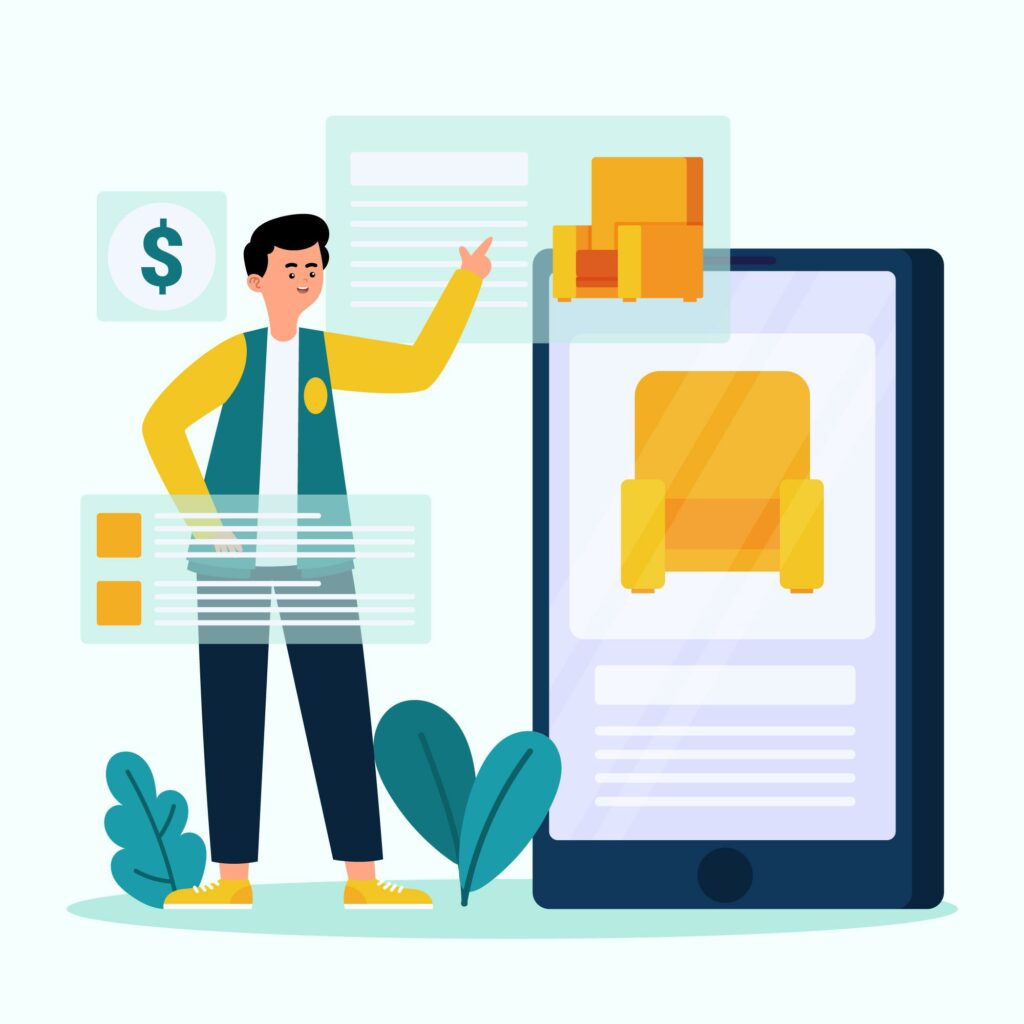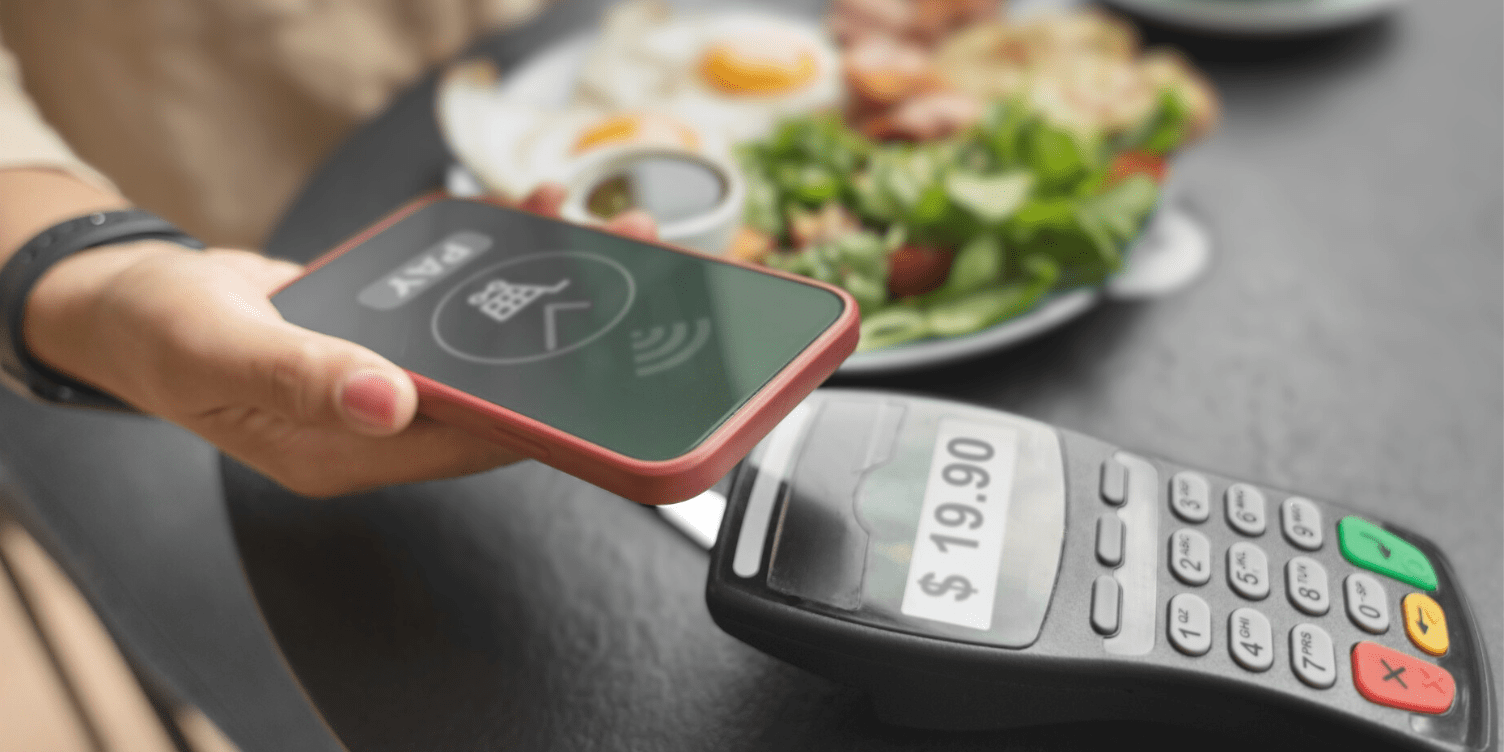In the technology-driven era, mobile app development companies are skyrocketing and developing new applications with extraordinary features continuously. Restaurant Mobile Payment Apps are one the great inventories of mobile app developers who have converted mobile phones to credit cards.
Hotels and restaurants’ mobile payment systems have made it simpler for both the owners and the customers to exchange money more conveniently. While there are still some restaurants and hotels that have not adopted this technology yet, all others are enjoying the convenience and enhanced customer experience.
This blog aims to delve into the significant role that restaurant mobile payment apps are playing in the food industry’s evolution. It will explore the current payment landscape in restaurants, discuss the advantages of mobile payment apps, and provide insights into key players in this domain.
It will address the critical aspects of security and privacy associated with these apps and shed light on the challenges and adoption barriers faced by both consumers and restaurants. It will also venture into the future of mobile payment apps in the food industry, considering emerging technologies and trends.
Through real-world case studies and success stories, the blog will exemplify how these apps are reshaping the restaurant experience for customers and helping businesses thrive in a technology-driven world. Ultimately, it will emphasize the growing importance of mobile payment apps and their potential to redefine the future of the food industry.
Mobile Payments Made Easy

Mobile payments are done with a smart device, such as a tablet or smartphone, for the purchase of items or services. A customer’s credit card or bank account is linked to the phone’s transaction app, which accepts payments. Users only need to scan their cell phone close to a QR code configured to accept mobile payments to finish the purchase.
Restaurant Mobile Payment Apps are increasing in popularity, owing to the ease they provide to clients, whether purchases are done on-location or remotely. Mobile payments for restaurants and hotels are now trending as they provide quality customer experience and convenience to both as well.
Restaurants and hotels are a step forward from all the other industries in adopting mobile payments. The hospitality sector is the most benefited sector due to mobile payments technology.
The restaurants can also go for their Restaurant Mobile Payment Apps for more personalized and secure transactions. The restaurant payment app should support all the paid apps for better customer service.
The other benefit of hotels and restaurants’ mobile payment apps is that it has reduced the security issues caused by point-of-sale systems. It saves restaurants from fraudulent payments and thefts. Security breaches are decreasing due to restaurant mobile payment apps resulting in greater revenue and a good reputation for restaurants.
The Impact of Technology on the Food Industry:
Technology has made a permanent imprint on the food business, reforming how we eat, request, and communicate with restaurants. From online reservations and food delivery apps to cutting-edge kitchen automation, technology has reshaped the landscape of food service.
In recent years, the integration of mobile payment apps has been a pivotal development. It has simplified payment processes, reduced wait times, and upgraded consumer loyalty. Technology has worked with information-driven bits of knowledge, permitting restaurants to tailor their contributions, and showcasing methodologies, and tasks to satisfy client needs more really. This symbiotic relationship between technology and the food industry highlights the transformative power of innovation, providing a glimpse into the future of dining experiences and payment solutions.
Mobile Application Security
The Shift Towards Digital Payment Solutions:
The advent of digital payment solutions has brought about a significant shift in how restaurant payments are conducted. Mobile payment apps, digital wallets, and contactless payment methods have built up some decent forward movement because of their speed, comfort, and improved security highlights. Customers can now utilize their cell phones to make installments, lessening the requirement for actual cards or money. This shift towards digital payment solutions has also been accelerated by the COVID-19 pandemic, as contactless payments are seen as a safer option to minimize physical contact.
Restaurants are increasingly adopting these technologies to meet customer expectations for a more efficient and secure dining experience. The convenience of digital payments not only benefits customers but also enhances operational efficiency for restaurants by reducing payment processing times and potential errors associated with traditional methods.
Ensuring the Safety of Customer Data and Transactions:
Ensuring the well-being of client information and exchanges is fundamental to portable installment applications in the restaurant business. Safety efforts should be set up to safeguard delicate data, for example, installment card subtleties and individual information. This includes robust encryption protocols to safeguard data during transmission and storage. Additionally, verification strategies like biometrics or PINs ought to be carried out to check client characters and prevent unauthorized access.
Furthermore, mobile payment apps must undergo regular security audits and penetration testing to identify vulnerabilities. In the event of a data breach, a reaction plan should be set up to limit harm and tell impacted parties immediately. By prioritizing data security, restaurants can build trust with customers and maintain their reputation.
Reasons why restaurants and hotels should embrace mobile payments.
We all know that hotels and restaurants’ mobile payment systems are already skyrocketing their business and also providing secure transactions with just a click. But, there are still some important aspects that are mentioned below that might help you understand the reason more clearly: why restaurants and hotels should accept mobile payments.
Enhanced customer experience
The main aspect and aim of all businesses is enhanced customer experience. When customers are welcomed with trending technologies and facilitated by providing bespoke facilities they enjoy and experience quality satisfaction. Mobile payments are also one of those facilities that not only offer smooth transactions but also help them upgrade their program or add on other benefits afterward.
Enhanced customer experience will add positive reviews to your restaurants which will automatically increase the bookings and revenue as well. Also, you can provide additional benefits to your customers like discounts on mobile payments that make them happy.
How To Find Uber-Like App Development Cost?
Quick and safe payments
Mobile payments are quick as compared to ancient methods of payment. Customers can pay remotely as well for pre-booking and more assured bookings. Also, it saves time waiting at the counter for payment and enables customers to take full advantage of the place.
Mobile payment apps use NFC technology and QR code that eliminates the exchange of bank or card details ensuring higher security. Mobile payments for restaurants and hotels are secure as well. It uses the same method of security which is used by the banks to track daily transactions without disclosing any personal information given by the customer. It reduces false payments and security breaches resulting in more profits and a better reputation.
Personalized restaurant mobile payment app
Mobile payment apps are common and used by almost everyone around you. To make your restaurant unique and special you should construct your personalized restaurant mobile payment app.
Creating a restaurant payment app is not rocket science, you only need to hire a mobile app developer or a mobile app development company that can provide you with the best mobile app developers to build your mobile payment app. This will increase your publicity as well as revenue making you fly high in the competitive market.
Apps like gPay have launched apps for iOS mobiles such as Applepay. You can also hire an iPhone app developer for iOS app development to provide benefits of your services to iOS users as well.
Integration with loyalty programs
Mobile payment apps have loyalty programs but are limited as there is a wide range of users and it is out of budget to offer loyalty to all of them. Your personalized app will have loyalty and rewards of your choice for your chosen customers.
You can provide rewards for days like Fridays or can also add family discounts or discount coupons for transactions from your app. Your app should support payments from other mobile apps but rewards and loyalties will be limited to your app resulting in increased app installation as well.
Hygienic payments
After the Pandemic, people are more concerned about hygiene and health. The mobile payment apps will lead to fewer contacts of hands and distanced payments will provide better customer satisfaction.
Also, mobile payments will present your hotel and restaurant smart and up-to-date about current affairs and being cautious regarding that. There will be cleanliness as the payments and invoices are being shared online so the hotels will be clean and hygienic which would attract and engage the customers.
Customer feedback
Give importance to customer feedback as the feedback will help improve the drawbacks and also increase traffic to your restaurant or hotel. Yumpingo is a restaurant established in London that offers a unique way to provide feedback. It hands over a device to its customer with the bill on which they can put their feedback and pay as well.
Such innovations increase your popularity and profit both simultaneously. Feedback can be taken through the apps you can ask to rate your restaurant in stars or percentages or ask to write feedback just after the payment is finished.
How Much Does It Cost to Develop a Mobile App
The Growing Importance of Mobile Payment Apps:
Mobile payment apps have become progressively imperative in the present high-speed world, changing how we handle exchanges, especially in the restaurant and food industry. These applications have acquired unmistakable quality because of their accommodation, security, and effectiveness. Customers are embracing mobile payment apps as a preferred method of settling bills, and restaurants are recognizing their potential to streamline operations and enhance the overall dining experience.
Beyond convenience, mobile payment apps offer a bridge between the digital and physical realms, enabling customers to seamlessly order, pay, and even earn rewards. In an era marked by contactless interactions and the need for speed, these apps are shaping the future of dining, providing a smoother and more efficient way to enjoy meals at restaurants.
Traditional Payment Methods in Restaurants:
Traditional payment methods in restaurants primarily revolve around cash and card transactions. Historically, customers have settled their bills using physical currency or credit/debit cards. Cash payments include the trading of banknotes and coins, while card installments require the utilization of retail location (POS) terminals to deal with exchanges.
These methods have been the norm for decades and have served as the foundation of restaurant payment processes.
While cash payments offer immediate liquidity and convenience for some customers, card payments introduced a layer of security and record-keeping. However, both methods have their limitations, and the evolving demands of modern consumers have necessitated a shift towards more advanced payment solutions.
Best Practices for Secure Mobile Payment App Development:
Secure mobile payment app development involves adhering to best practices to mitigate potential vulnerabilities. Some key practices include:
Secure Coding:
Developers should follow secure coding practices to prevent common vulnerabilities like SQL injection and cross-site scripting (XSS).
Data Encryption:
Strong encryption methods help protect the data at the time of transit and after. This includes using secure communication protocols like HTTPS and encrypting stored data.
Regular Updates:
Keep the app and its dependencies up to date to address security vulnerabilities that may arise over time.
Authentication and Authorization:
Employ strong user authentication methods, such as biometrics or two-factor authentication (2FA), and restrict access to sensitive functions based on user roles.
Secure APIs:
If the app uses APIs for communication, ensure that API endpoints are secure and access is controlled.
Third-Party Libraries:
Use reputable third-party libraries and libraries with active maintenance to reduce the risk of security issues.
Penetration Testing:
Regularly conduct penetration testing to identify and address vulnerabilities in the app. It is compulsory to apply this cycle consistently to give clients an elevated degree of safety.
Exploring the Benefits of Mobile Payments
Decreased expenses
By choosing mobile payments, you can cut costs in a few different ways. With the capacity to email invoices, you are not required to purchase pricey point-of-sale (POS) technology or paper and ink. Also, since you can establish your mobile point-of-sale system using a smartphone or tablet device, the only additional expense is a card reader.
Alternatively, you might choose QR code payments, which would eliminate the necessity for a card reader or mobile POS system. A smartphone or other mobile device is all that is required to get going.
Cash-flow improvement
The cash you get in hand from the customer is easily reachable to you and you spend it on something like daily requirements. This results in zero budget and calculation of what you earn in a day and saving are also difficult.
Online payments increase your cash flow as the more customers will visit your place the more cash will be directly deposited to your bank account resulting in an improvement of cash flow. Those who prefer mobile payment will directly scan and pay and you will get money fast and it will be visible.
Stay competitive
COVID-19 has triggered the use of mobile payments as it eliminates hand contact and has fewer chances of being infected. All industries, especially the hospitality sector, started adopting mobile payments to increase customer satisfaction and enhance business opportunities.
To stand out in the competitive market you must have to adopt the trending technologies to optimize your businesses and take measures to improve customer experience. Mobile payment for restaurants and hotels has now become a need to stand out and stay competitive in this industry.
Ways of payments
There are different ways of payment and customers adopt ways according to their choices and comfort. To expand your business and increase customer experience you can embrace more than one way of payment by hire iPhone app developers and Android app developers in India.
You can build an app or digital wallet like Google Pay, Paypal, etc, and also adopt card payment equipment like a machine to read credit cards or you can adopt the most convenient and easily adoptable QR code payment method.
Potential difficulties
Implementing mobile transactions is undoubtedly not a simple move for any organization; while it might produce beneficial developments, it may also prove challenging. The restaurants often made mistakes in managing the wait times for walk-in customers and those who had placed mobile prepaid orders.
Restaurants and hotels should be compelled to provide excellent service to all customers, regardless of their preferred payment technique, to avoid consumer annoyance. Self-serve booths can also be useful additions to dining establishments and reception areas.
The Drawbacks and Limitations of Cash and Card Payments:
Cash payments, though widely accepted, come with drawbacks such as the need for exact change, the risk of loss or theft, and limited traceability. Handling cash can also slow down the payment process, leading to longer wait times for customers and potentially impacting restaurant efficiency.
On the other hand, card payments, while more helpful, have limits like the gamble of card misrepresentation, the requirement for actual cards, and expected specialized issues with POS terminals. Additionally, card transactions can incur fees for both customers and merchants, impacting overall costs.
Regulatory Compliance and Data Protection:
Compliance with regulations and data protection laws is crucial for mobile payment apps. Restaurants should comply with information assurance guidelines like the Overall Information Security Guideline (GDPR) in Europe or the Installment Card Industry Information Security Standard (PCI DSS) for dealing with installment card information. Compliance involves implementing strong security measures, maintaining proper data records, and obtaining user consent for data processing.
Last words
Mobile payments are no longer a luxury, it has now become a basic need of customers as well as businesses. No matter the status, everyone now has mobile payment available to pay or receive. When mobile payments are becoming so popular how can restaurants and hotels stay back in entailing them? A large number of hotels and restaurants have already moved on to mobile payment methods and others will soon adopt them.
If you have still not switched your restaurant’s payment system to mobile payments and are looking for a mobile app development company that provides the best mobile app development services, Nevina Infotech is here at your service. Hire app developers from our company to enjoy hassle-free mobile payments at your restaurants and hotels.
FAQs
What is the prime benefit of mobile payments for restaurants and hotels?
Among many advantages of embracing mobile payments for restaurants and hotels, the main benefit is that it enables businesses like hotels to welcome visitors across the globe, incorporate payments with reservation platforms, and inevitably offer their favored localized payment method which enhances the customer experience and adds more personalization.
What are the common methods of payment in restaurants?
Credit cards were commonly used by restaurants for payments but nowadays most of them are switching towards mobile payments and e-wallets for better customer experience.
What are the major points that should be considered seriously while adopting mobile payments?
Businesses, especially restaurants, and hoteliers should be kept in mind while switching towards mobile payments are security, cost, customer experience, and integration with other mobile payment systems.
Read more:-



